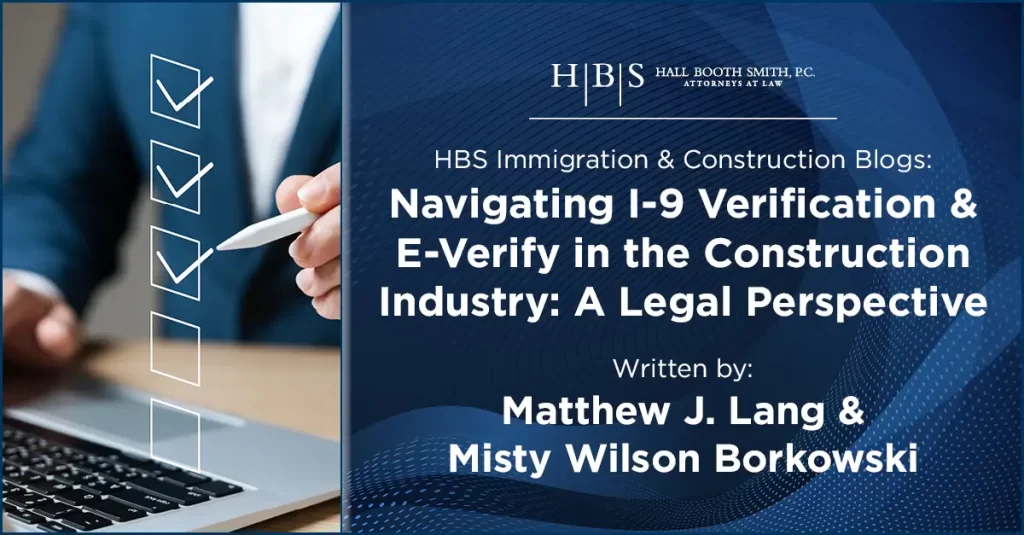
Navigating I-9 Verification & E-Verify in the Construction Industry: A Legal Perspective

In an era of heightened immigration enforcement and compliance, it is crucial for businesses, especially those in the construction industry, to understand and adhere to the requirements of I-9 verification and E-Verify. Immigration laws in the United States have significant implications for employers, and failing to comply can result in severe penalties.
Understanding I-9 Verification
Form I-9 is an essential document used to verify the identity and employment eligibility of every employee hired in the United States, regardless of their immigration status. Construction companies are no exception to this requirement.
The I-9 Form must be completed by both the employer and the employee within three days of the employee’s start date. It is crucial to ensure the accuracy and completeness of the information provided, as any errors or omissions can lead to potential penalties in the event of an audit.
To comply with I-9 verification requirements, construction companies must do the following.
Timely Complete Form I-9
The employee is required to complete Section 1 on the first day of employment. The employer is responsible for completing Section 2 of Form I-9, which includes examining the employee’s documents and attesting to their authenticity.
Acceptable documents are categorized into three lists (A, B, and C) and include items such as passports, driver’s licenses, and Social Security cards. While employers are not expected to be “experts” when reviewing documents presented by an employee, the employer must still review these documents to confirm that the documents appear on their face to be authentic.
Retain Form I-9 & Supporting Documents
Once completed, employers must retain these forms for a specified period, even after an employee’s termination.
Employers are required to retain Form I-9 and any supporting documents for at least three years from the date of hire or one year after the employment relationship ends, whichever is later.
E-Verify & the Construction Industry
While I-9 employment verification is a mandatory process, E-Verify is an electronic system that employers can voluntarily use to verify an employee’s eligibility to work in the United States.
In some states, including Arizona, Georgia, Mississippi, South Carolina, Alabama, and Utah, the use of E-Verify has been mandated by law for certain employers. These states have taken proactive measures to ensure a legal workforce and combat unauthorized employment.
- Arizona
Arizona has been at the forefront of immigration-related legislation and enforcement. In 2007, Arizona enacted the Legal Arizona Workers Act (LAWA), which requires all employers in the state to use E-Verify. This includes employers in the construction industry who must verify the work eligibility of their employees through E-Verify within three business days of hiring.
- Georgia
Compliance Act (GSICA), enacted in 2006, mandates that private employers with more than 10 employees and all government contractors must use E-Verify to confirm the work eligibility of newly hired employees.
- Mississippi
Mississippi has also enacted legislation that mandates the use of E-Verify for certain employers, including those in the construction industry. The Mississippi Employment Protection Act (MEPA), enacted in 2008, requires public and private employers with 30 or more employees to use E-Verify to verify the work eligibility of newly hired employees.
- South Carolina
South Carolina enacted the South Carolina Illegal Immigration Reform Act in 2008. Under this law, all employers in the state are required to utilize E-Verify to confirm the employment eligibility of new hires.
- Alabama
Alabama passed the Beason-Hammon Alabama Taxpayer and Citizen Protection Act (HB 56) in 2011. This law mandates that all employers, regardless of their size, must use E-Verify to determine the employment eligibility of newly hired employees.
- Utah
Utah enacted the Utah Immigration Accountability and Enforcement Amendments (HB 116) in 2010. This law requires all Utah employers to use E-Verify for newly hired employees.
- Florida
Florida Governor Ron DeSantis signed into law Senate Bill 1718 on May 10, 2023. The centerpiece of the new law is a provision requiring private sector employers with more than 25 employees to use the federal E-Verify system to vet the employment eligibility of new employees. This requirement goes into effect on July 1, 2023, and only applies to newly hired employees on or after that date.
Benefits of E-Verify Laws
These state laws aim to promote a legal workforce by mandating E-Verify usage, specifically targeting industries like construction that often rely on a large number of workers. By requiring employers in the construction sector to utilize E-Verify, these states seek to deter the employment of unauthorized workers and ensure compliance with federal immigration laws.
For example, E-Verify offers several benefits to employers in the construction industry:
- Enhanced Compliance
E-Verify provides an additional layer of scrutiny to ensure that employees’ work authorizations are valid. By utilizing this system, construction companies can minimize the risk of employing individuals without proper documentation.
- Mitigation of Legal Risks
Engaging in E-Verify demonstrates an employer’s commitment to compliance and helps mitigate potential legal risks associated with employing unauthorized workers. In case of an audit, employers who have consistently used E-Verify are likely to receive more favorable treatment.
- Competitive Advantage
Using E-Verify can enhance the reputation of construction companies by showcasing their commitment to hiring a legal workforce. This commitment to compliance can help attract clients, win bids, and create a positive image within the industry.
Unintended Consequences of E-Verify Mandates
Since these regulations promote a legal labor force, they will very likely suppress the undocumented labor force in states where E-Verify mandates exist. As a result, many construction companies may face difficulties recruiting and retaining skilled labor.
According to the U.S. Census Bureau, up to 30% of construction workers in the United States were foreign born. Approximately 54% of those workers were undocumented between 2014 and 2019
Thus, construction companies with pending contracts in states with newly passed (or contemplated) E-Verify laws may very well run into difficulties satisfying existing contractual obligations or established construction timetables. Companies contracted to complete work in those states may also face heightened and unanticipated costs as a result of a smaller pool of eligible workers.
To compound those issues, if construction companies who are unable to satisfy contractual obligations face a suit for breach of contract or a related cause of action, those companies will very likely not be able to rely upon impossibility of performance as a defense to those suits. Impossibility generally requires that a non-performing party prove impossibility and the unforeseen nature of the act or occurrence giving rise to the proffered impossibility. Since construction companies would have been required to comply with I-9 verification prior to E-Verify statutes being enacted, inability to recruit and retain adequate labor following imposition of an E-Verify requirement will not suffice for an impossibility defense.
Additionally, in many cases, general liability insurance policies exclude breach of contract claims from coverage for insured construction companies. Therefore, construction companies facing suit may find themselves without coverage for colorable breach of contract claims arising from those companies’ inability to recruit sufficient labor to satisfy contractual obligations.
Finally, E-Verify laws will very likely cause an increase in construction costs in states where they are enacted, potentially stymieing new projects, and reducing profits by increasing overhead for existing projects.
Conclusion
For construction companies, compliance with I-9 verification and E-Verify requirements is crucial to mitigate legal risks and maintain a strong reputation in the industry. Understanding the intricacies of these processes and keeping up with changing immigration laws can be challenging but is vital for success.
By working with experienced immigration attorneys and leveraging the benefits of E-Verify, construction businesses can demonstrate their commitment to compliance, protect their interests, and contribute to a sustainable and law-abiding workforce.
However, construction companies in states with newly passed or contemplated E-Verify laws may find themselves at a disadvantage when it comes to recruiting and retaining sufficient labor to satisfy existing obligations. Those companies may face compounded issues related to increased costs, decreased profits, a greater risk of suit, and insurance coverage exclusions. Thus, retaining experienced construction defense counsel at the first hint of a lawsuit will be critical to protect a company’s interests and assets.
Disclaimer
This material is provided for informational purposes only. It is not intended to constitute legal advice nor does it create a client-lawyer relationship between Hall Booth Smith, P.C. and any recipient. Recipients should consult with counsel before taking any actions based on the information contained within this material. This material may be considered attorney advertising in some jurisdictions. Prior results do not guarantee a similar outcome.
About the Authors
Matthew J. Lang
Red Bank Associate Matthew J. Lang focuses his practice on complex construction and general liability matters. Matthew has represented clients in all stages of litigation from initial pleadings through appeals, including expert and fact discovery, and motion practice.
Misty Wilson Borkowski
Little Rock Partner Misty Wilson Borkowski concentrates her practice on immigration matters, serving clients throughout the United States, from multinational companies to hospitals, tech companies, and especially farms.


Leave a comment
You must be logged in to post a comment.